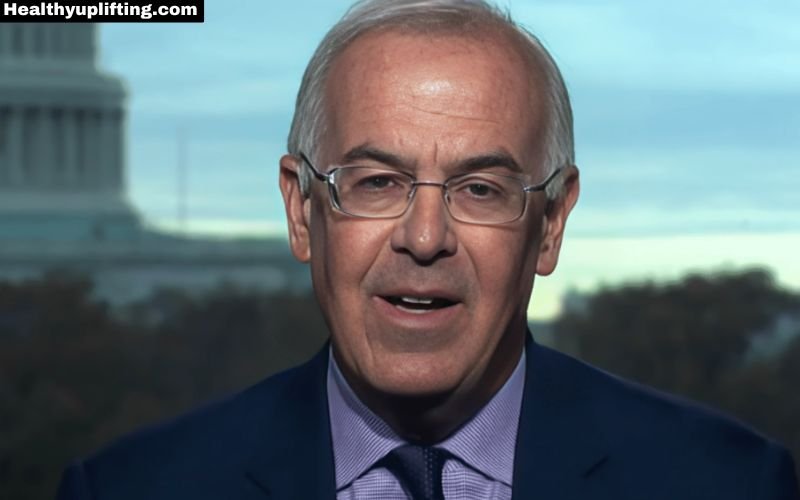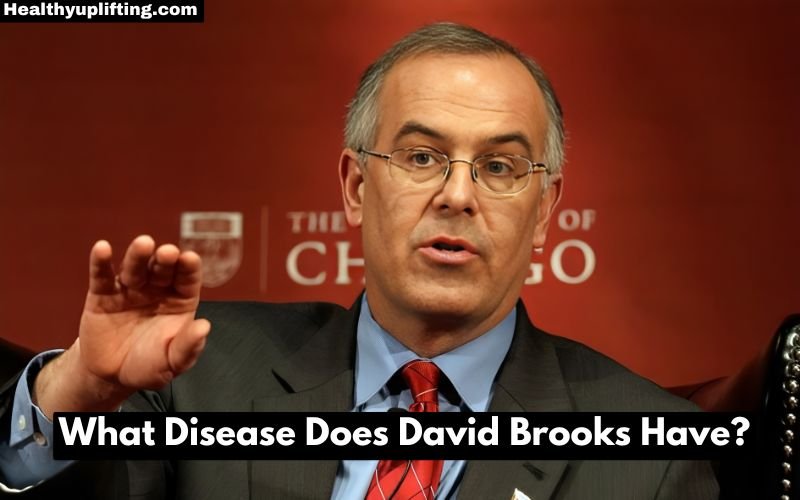David Brooks, one of America’s most prominent journalists, authors, and public intellectuals, has gained widespread recognition for his insightful commentary on politics, society, and cultural issues. He has written for leading publications like The New York Times, The Wall Street Journal, and The Washington Post, and is a regular commentator on PBS NewsHour and NPR. However, in recent years, Brooks has also become known for his candid reflections on personal challenges, especially those relating to emotional and mental well-being.
While Brooks has not openly disclosed suffering from any specific disease in the traditional sense—be it a physical illness or a diagnosable mental health condition—his writings and speeches reveal his deep emotional struggles and crises. Through his books, essays, and public speeches, Brooks has detailed experiences that suggest issues commonly associated with mental health conditions, including depression, loneliness, and identity crisis. This article aims to explore these aspects of Brooks’ life in detail, shedding light on the broader subject of mental health struggles and the challenges faced by public figures like him.
David Brooks’ Public Career and Persona
David Brooks’ career has been largely defined by his intellectual rigor and thoughtful analyses. Born on August 11, 1961, in Toronto, Canada, Brooks moved to New York City when he was young and attended the University of Chicago, where he studied history. He began his career as a journalist, quickly rising through the ranks to become a widely respected commentator on American politics, culture, and society.
His reputation is built upon an ability to balance multiple perspectives and provide nuanced commentary, making him a regular contributor on various media platforms such as PBS and NBC’s Meet the Press. Brooks has authored several books, including Bobos in Paradise: The New Upper Class and How They Got There (2000), The Social Animal: The Hidden Sources of Love, Character, and Achievement (2011), and The Road to Character (2015). These books reflect his deep thinking on societal trends and human behavior.
The Emergence of Personal Struggles

Despite his success in public life, David Brooks has made it clear that he, like many others, has faced deep personal challenges. In recent years, he has written extensively about his own struggles, notably in his 2019 book The Second Mountain: The Quest for a Moral Life. In this book, Brooks narrates his experience of navigating a personal crisis that includes the dissolution of his first marriage, feelings of disillusionment, and a deep sense of loneliness.
Brooks divides life into two metaphorical mountains. The first mountain is the pursuit of personal success, achievement, and fulfillment, characterized by career accomplishments, social recognition, and individual ambitions. However, after reaching the summit of this mountain, many people—like Brooks—discover that the satisfaction is fleeting, and the success does not fill the deeper, emotional voids. The “second mountain” is the pursuit of more profound, meaningful connections and service to others, a life characterized by love, community, and moral purpose.
It is clear that Brooks experienced what could be considered a “midlife crisis,” but one that was marked by deep emotional and psychological pain. This period of his life suggests a type of existential depression or spiritual crisis—a phenomenon not uncommon among high achievers who, despite outward success, feel an intense inner emptiness or lack of meaning.
Emotional Struggles, Loneliness, and the Shadow of Depression
While Brooks has not explicitly described his personal experiences as depression, the symptoms he has outlined in his writings and talks resemble those commonly associated with the condition. Depression, a mental health disorder affecting millions worldwide, is characterized by persistent feelings of sadness, hopelessness, lack of interest in activities, and difficulty functioning in daily life.
In his book The Second Mountain, Brooks discusses how, despite his professional success, he felt a deep sense of loneliness. He described the experience of going through his divorce as a period of “emotional wilderness,” where he found himself disconnected from meaningful relationships. This isolation, compounded by societal pressures, weighed heavily on Brooks and led to a reevaluation of his life.
Loneliness, a recurring theme in Brooks’ work, is also a significant public health issue. Studies show that prolonged loneliness can have severe mental and physical health consequences, contributing to conditions such as depression, anxiety, cardiovascular disease, and a weakened immune system. Brooks has described loneliness as “the real pain at the core of our society.”
In an essay for The Atlantic titled “The Nuclear Family Was a Mistake,” Brooks discusses how societal structures have shifted over time, leaving many individuals feeling isolated. He points to the breakdown of extended family systems and the rise of nuclear families as contributors to a sense of alienation. This feeling of disconnection, which Brooks experienced personally, is something he sees as a widespread issue in modern life.
While Brooks has not publicly admitted to suffering from clinical depression, his experience aligns with what many people who battle depression go through—a loss of purpose, a feeling of disconnection from others, and difficulty finding meaning despite external accomplishments.
The TED Talk: Brooks’ Reflections on Inner and Outer Life
Brooks’ reflections on his emotional struggles have resonated with many because they touch on a universal human experience—the conflict between inner life (personal virtues and fulfillment) and outer life (achievement and social recognition). In his widely viewed 2015 TED Talk, “Should You Live for Your Résumé… or Your Eulogy?” Brooks draws attention to the difference between the virtues we cultivate for our résumés, such as skills and accomplishments, and those that will be remembered in our eulogies, such as kindness, integrity, and love.
In this talk, Brooks encourages people to focus on developing “eulogy virtues” rather than solely “résumé virtues.” This call to action is rooted in his own life experiences, particularly the internal conflict between outward success and inner emotional fulfillment. Brooks suggests that focusing only on external achievements can leave people feeling empty and disconnected.
This inner-outer conflict is often central to the struggles faced by public figures who, like Brooks, live in the spotlight and feel pressure to meet external expectations. The emphasis on personal achievement and societal recognition often overshadows the importance of nurturing inner emotional well-being.
Public Figures and Mental Health: A Broader Conversation
David Brooks’ reflections are part of a larger conversation about the mental health challenges faced by public figures. In recent years, several high-profile individuals have spoken out about their struggles with mental health, breaking the stigma around the issue. For instance, British royalty Prince Harry has been open about his battles with mental health, particularly following the death of his mother, Princess Diana. Pop star Lady Gaga has also spoken candidly about her struggles with depression and anxiety.
Brooks, although not as explicit about a particular diagnosis, has contributed to this important conversation by exploring how public success does not shield individuals from emotional struggles. In fact, public figures often experience unique pressures and challenges that can exacerbate feelings of isolation and disconnection.
For journalists like Brooks, who must constantly engage with pressing social and political issues, the emotional toll of their work can be significant. Reporting on difficult and often divisive topics, coupled with the demands of maintaining a public persona, can lead to emotional burnout and a sense of alienation. This is particularly true for those, like Brooks, who are tasked with interpreting and explaining complex societal issues in an era of rapid change and political polarization.
Brooks’ Path to Personal Redemption: The Second Mountain
While much of Brooks’ recent writing focuses on the emotional and existential struggles he has faced, he also offers a path forward. In The Second Mountain, he emphasizes the importance of community, connection, and living a life of service. According to Brooks, the second mountain represents a more fulfilling stage of life, one where individuals find deeper meaning by contributing to the well-being of others.
For Brooks, moving beyond the first mountain of personal success to the second mountain of moral and relational fulfillment has been a source of personal redemption. He describes this journey as one of finding true joy and satisfaction in life by prioritizing relationships and community over individual achievements.
See Also: What Disease Does David Jeremiah Have Now?
FAQs
Has David Brooks publicly disclosed any specific disease or illness?
No, David Brooks has not publicly disclosed any specific physical illness or disease. However, he has been open about emotional and mental health challenges, particularly issues related to loneliness, personal crisis, and emotional turmoil. While he has not confirmed a diagnosis of depression, his writings reflect struggles that are commonly associated with mental health issues.
What are some of the personal challenges David Brooks has faced?
David Brooks has been candid about experiencing significant personal challenges, including the dissolution of his first marriage, a sense of isolation, and existential crises. He has described periods of deep loneliness and disillusionment, prompting him to reevaluate his life and focus on more meaningful connections.
Does David Brooks have depression?
Although David Brooks has never explicitly stated that he has depression, many of the symptoms he describes—such as feelings of loneliness, a lack of purpose, and emotional disconnection—are often associated with depression. His reflections on these struggles suggest he has faced challenges similar to those experienced by people with depression, but no formal diagnosis has been shared publicly.
Conclusion
While David Brooks has not been diagnosed with any specific disease, his personal experiences shed light on the complex and multifaceted nature of mental health and emotional well-being. His writings on loneliness, isolation, and the search for deeper meaning resonate with many people who experience similar struggles, even if they do not have a formal mental health diagnosis.
Brooks’ journey serves as a reminder that public success and outward accomplishments are not enough to guarantee personal fulfillment or happiness. Mental health challenges can affect anyone, regardless of their professional achievements, and addressing these challenges requires introspection, community, and a shift toward deeper, more meaningful connections.
In today’s fast-paced, achievement-oriented society, Brooks’ reflections offer a valuable lesson: The pursuit of external success should not come at the expense of our inner emotional well-being. By focusing on “eulogy virtues” and cultivating meaningful relationships, we can find the true joy and fulfillment that comes from living a life of purpose and service to others.

